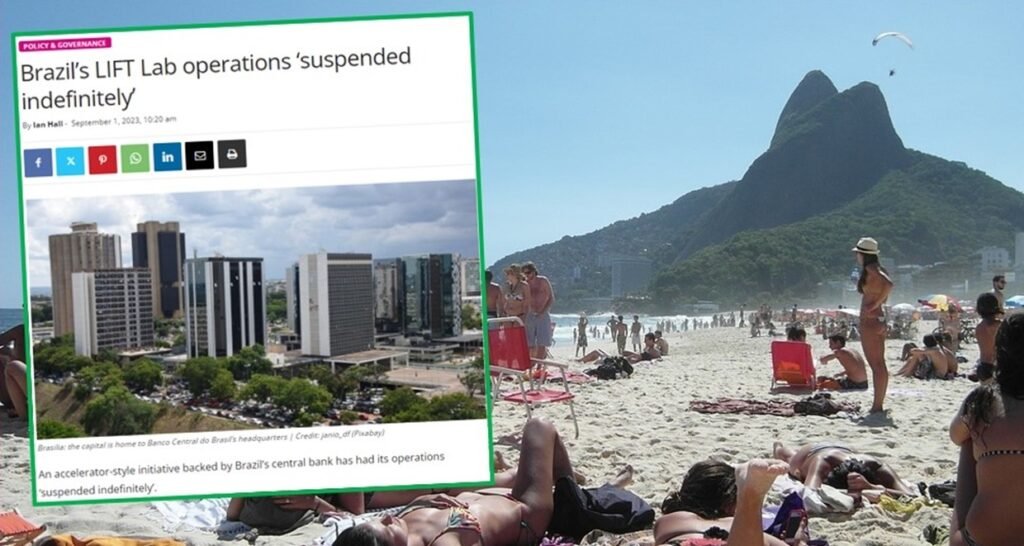
An accelerator-style initiative backed by Brazil’s central bank has resumed its activities after an ‘indefinite suspension’ of its operations last year.
LIFT Lab (Financial and Technological Innovations Laboratory) was launched by the Banco Central do Brasil (BCB) alongside the National Federation of Associations of Central Bank Servers (Federação Nacional de Associações dos Servidores do Banco Central – Fenasbac) more than six years ago. It sees BCB officials and sponsoring organisations advising on the development of annual cohorts of early-stage fintech-based projects.
The BCB revealed in August last year the nine projects selected for what was due to be a ‘2023’ edition. But, in an unorthodox turn of events, used the same announcement to state that the ‘current LIFT Lab is suspended indefinitely due to operational and human resource limitations.’
Fast forward almost a year and the BCB has announced that the LIFT Lab has ‘resumed innovation projects for the National Financial System’ and that seven projects will be participating in the ‘2023/2024’ edition.
The BCB’s announcement of the LIFT Lab’s resumption summarises the seven projects as being in fields such as anti-money laundering (AML) and blockchain. They include initiatives intended to capitalise on Brazil’s popular instant payments system Pix, the instant payment system launched by the central bank in 2020.
RELATED ARTICLE Brazil’s LIFT Lab operations ‘suspended indefinitely’ – our news article (1 September 2023) on the LIFT Lab’s pause
Seven projects underway
The first three projects listed are for: ‘preventive AML and compliance: technological solutions for anti-money laundering and compliance’; ‘interoperability gateway: B2B [business-to-business] interoperability solution that operates between incompatible blockchain networks’; ‘and GreenFi decentralised finance for sustainability: solution to establish a decentralised financial ecosystem for tokenised green assets.’
The four further projects listed as: ‘blockchain-based KYC [know-your-customer] for credit rating: solution focused on building a decentralised network for appraising and granting credit, aligned with open finance principles’; ‘PIX Alias Score: developing a score for the Pix instant payments system, monitoring safe zones and identifying fake accounts’; ‘SmartSafe: programmable, secure and intuitive digital wallet solution for storing crypto assets’; and ‘Guaranteed Agribusiness Token – TAG: asset tokenisation for agribusiness’.
Three projects on the original ‘LIFT Lab: Meet the projects selected in 2023’ announcement (25 August 2023) have disappeared from the list or seem to have evolved. Specifically: ‘Pix Card’; ‘Pix Debita Lá (‘Pix Debit There’); and ‘Pix Key Score’
The BCB’s announcement (18 July) of the LIFT Lab’s resumption does not detail how the resumption of activity was triggered.
But it states that the initiative is currently supported by technology companies including AWS, Cielo, Finansystech, Idwall, Microsoft, Multiledgers, R3 and Veritran; and that the newly revive programme will culminate a ‘final delivery event’ known as ‘LIFT Day’ and report (‘LIFT Papers’).
RELATED ARTICLE Brazil’s CBDC strives to overcome data-privacy ‘obstacle’ as pilot tests evolve – a news article (11 June 2024) on the BCB’s development of a central bank digital currency (CBDC) – it stated that data-privacy challenges remain an ‘obstacle’ as it geared up for a second phase of pilot tests
‘Super-app’ potential
Separately, the central bank’s president Roberto Campos Neto has recently spoken about the potential for a ‘super-app’ to capitalise on fintech-powered innovation in the banking and payments sectors.
In addition to Pix, the BCB is also progressing the development of a central bank digital currency (CBDC) called Drex.
Discussing the BCB’s innovation agenda on stage at the ‘Blockchain Rio’ event on 24 July, Campos Neto spoke about such an app that could also integrate the use of artificial intelligence (AI).
“At some point we will have a super-app where you will be able to connect with data intelligence and artificial intelligence,” he was reported by media including Exame as saying.
“We imagine that in the very near future people will no longer have several bank applications, there will be some kind of aggregator, with the advantage of having aggregated data. But we need to take all this to the next step, which is to make all this tokenised. And that’s where Drex comes in,” Campos Neto reportedly told the audience as saying.

